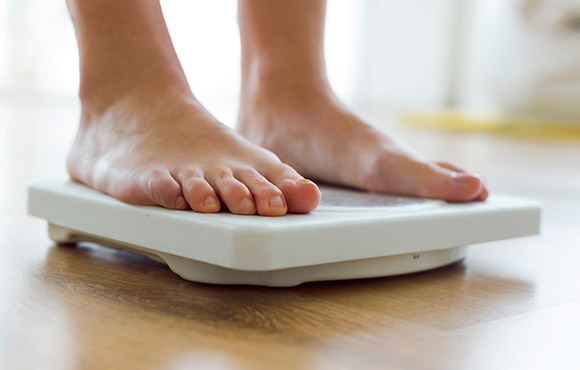For anyone who struggles with losing weight, the statement above can be downright infuriating.
If it's actually that simple, then why can't you achieve your ideal weight? You follow a program perfectly but still don't see the results you want—or, at least, not permanently.
The missing link? Your brain. That's right, the organ that's responsible for making 35,000 conscious decisions a day, including every bite you eat and every exercise you attempt.
If your brain isn't on the same page as your body, you might have a hard time seeing lasting progress. The good news? There are a few ways you can train your brain to work with you, not against you.
1. Ditch the scale obsession.
1 of 7
No, really. When you're obsessed with the scale, the number you see could mean the difference between a great day and a complete breakdown, which sets you up for disastrous results.
Though you'll want to measure progress, make your weigh-ins reasonable. If you typically step on the scale once a day, consider changing to weekly or bi-monthly weigh-ins.
Most importantly, don't let the scale control you. It's just a number, and it's not always reflective of your true progress and hard work.
2. Shift your beliefs.
2 of 7
Throughout your lifetime, you've probably heard several different beliefs about food. Your parents may have encouraged you to clean your plate, even when you were full. You may have watched your mother or father groan about being on a diet. Or maybe you've heard your friends say that they "shouldn't" eat this or that or that they "should" go to the gym.
All of these statements can make a huge impact on how you view weight loss.
Write down all the judgement-based statements you can think of and throw out any that are making you constantly feel guilty or bad about yourself. Your attempts to get healthier should be a positive space, not filled with self-loathing or countless rules to follow.
3. Invest in a good therapist or counselor.
3 of 7
A neutral third party with experience in helping people work through their problems can not only improve your overall quality of life, but can also address specific weight-related issues. You could literally be holding onto the baggage of your past with excess weight or using unhealthy coping habits like binge eating to deal with your emotions.
If you've never seen a therapist before, be sure to do your research and find one that fits your specific needs. Some therapists will even offer a complimentary phone session so you can see whether you're compatible.
4. Remember your accomplishments.
4 of 7
Did you eat clean all day but forgot to squeeze in that workout? Focus on the accomplishment of eating well and keep a journal of those wins each day. Research shows that when you place your mental focus on your achievements instead of your failures, it has a domino effect, leading to more positive outcomes.
5. Focus on how you're feeling instead of your physical appearance.
5 of 7
Tapping into how your body feels instead of how it looks will help you make positive choices from a more intuitive place. When you know your body always feels better while eating healthy, fresh food, regardless of any physical outcome, it's easier to stick to good habits over time.
6. Practice forming new behavior patterns.
6 of 7
Your brain is wired for routine and creates neural pathways as you develop patterns of behavior. It wants to make connections to certain things you do every day, like drinking water or brushing your teeth, so that they become easier to repeat. However, if you've developed unhealthy eating habits, those also formed neural pathways in your brain.
Becoming conscious of your patterns, and then working to form new, healthier habits by repeating them over and over, will help your brain develop new connections so that you can make healthier choices with less effort.







Discuss This Article